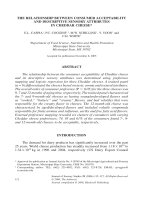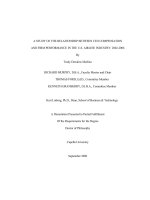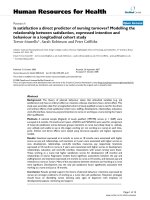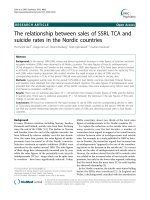A study showing the relationship between extent of participation of rural youths towards management activities relating to farming with socio - Economic and psychological characteristics in
Bạn đang xem bản rút gọn của tài liệu. Xem và tải ngay bản đầy đủ của tài liệu tại đây (227.21 KB, 5 trang )
Int.J.Curr.Microbiol.App.Sci (2018) 7(1): 2882-2886
International Journal of Current Microbiology and Applied Sciences
ISSN: 2319-7706 Volume 7 Number 01 (2018)
Journal homepage:
Original Research Article
/>
A Study Showing the Relationship Between Extent of Participation of Rural
Youths Towards Management Activities Relating to Farming with Socio Economic and Psychological Characteristics in Jorhat District of Assam, India
M. Buragohain1*, N. Bordoloi1 and I. Lego2
1
Department of Extension Education, Assam Agricultural University, Jorhat-13, Assam, India
2
Department of Extension Education, College of Post Graduate Studies, CAU,
Meghalaya, India
*Corresponding author
ABSTRACT
Keywords
Rural youth,
Participation,
Management
activities
Article Info
Accepted:
20 December 2017
Available Online:
10 January 2018
The study entitled “A study showing the relationship between extent of participation in
management activities, with socio-economic and psychological characteristics of rural
youths towards farming in Jorhat district of Assam”, following Ex-Post-Facto research
design. A total of 200 respondents were selected by using multistage purposive cum
random sampling technique. The data were collected by means of personal interview
schedule during 25th Feb, 2016 - 3rd April, 2016. The findings revealed that age (0.589),
size of operational land holding (0.172), annual income of the family (0.092), training
exposure (0.483) and mass media exposure (0.435) of the respondents is positively
significant and highly correlated with extent of participation in management activities.
However, occupation of parents ( 2 = 30. 254*) had significant association at 5 per cent
probability level with extent of participation in management activities. The regression
coefficient of age, age (b = 0.534), sources of farm machineries and farm implements (b =
-0.343) and attitude towards farming (b = 1.074) were found to be significant. The coefficient of multiple determinations (R2=0.624) explain together 62.40 per cent to the total
variation on the extent of participation in management activities.
Introduction
The World Bank (2001) noted that majority of
the world population consists of young people,
three quarters of them living in the rural areas.
Adesope (1999) in Matthews-Njoku and
Ajaero (2007) noted that youths represent the
most active segment of the population and the
engine that would do most productive work of
the society. Youths constitute a formidable
force in the agricultural production process,
constituting a sizeable proportion of the
workforce especially in the rural areas.
Adebayo et al., (2006) noted that despite their
(youths) rich rural life, farming background
and experience, rural youths are yet to actively
and
productively participate
in
the
development of the nation‟s agricultural
sector. This is related to the dearth of viable
institutional framework for mobilizing,
developing and channelling the unique
2882
Int.J.Curr.Microbiol.App.Sci (2018) 7(1): 2882-2886
abilities, experiences and aspirations of rural
youths towards agriculture.
State like Assam where rice is the main basis
of agricultural system and farmers of Assam
are characterized by small land holding, less
cash inflow and poverty. The development of
this region depends on the development of
agriculture through modern technologies and
more participation of rural youths. Further, the
participation of rural youths in rice cultivation
will be motivating factor for developing a
sense of work culture for the youths of the non
sampled area and also for generating income
through such production oriented activities.
Extent of participation in management
activities was defined as the frequency at
which the rural youth took active part in
various farm management activities. In this
study active participation of the rural youths in
management activities related to various
aspects of farming were identified where
participation of rural youths is possible. The
focus of the study was to examine the
relationship between participation of the rural
youths in management activities with various
socio-economic
and
psychological
characteristics towards farming in Jorhat
district of Assam.
Materials and Methods
The population of the study comprised the
rural youths in the study area that were
engaged in farm operation during the study.
Jorhat district was purposively selected for the
present study.Two sub-division viz. Jorhat and
Titabor were selected randomly from Jorhat
district. Two A.D.O. circles from each sub
division were selected randomly. These were Dhekorgorah and Teok A.D.O. circles under
Jorhat sub-division and Madhapur and
Baghchung A.D.O. circles under Titabar subdivision were selected randomly. Two villages
from each A.D.O. circle were selected
randomly for the present study. Thus
altogether there were eight randomly selected
villages. Hence a total of 200 rural youths
were sampled.
Data were collected using structured schedule
and open ended questions administered to 200
randomly selected respondents. Variable for
analysis included the following: Age,
Education, Type of family, Size of family,
Operational land holdings, Annual income of
family, Occupation of parents, Training
exposure, Attitude towards farming, Mass
media exposure and level of participation in
farm operations, management activities and
decision making. Data analysis was carried
out through the use of frequency counts,
percentages.
Results and Discussion
The independent variable age (r = 0.589), size
of operational land holdings (r = 0.172),
annual income of the family (r = 0.092),
training exposure (r = 0.483) and mass media
exposure (r = 0.435) of the respondents is
positively significant and highly correlated
with extent of participation in management
activities at 1 per cent level of probability.
It was also found that size of family (r = 0.143)
and attitude towards farming (r = 0.637) is
positively significant and moderately correlated
at 0.05% probability level. It was further seen
from the analysis that there is a negative and
non-significant relationship between sources of
farm machineries and farm implements (r = 0.019) with extent of participation in
management activities (Table 1).
The Table 2 showed that occupation of parents
( = 30. 254) had significant association at 5
per cent probability level with extent of
participation in management activities
2
educational level ( = 28.768) and type of
family ( =2.420) showed no association
with extent of participation in management
2883
2
2
Int.J.Curr.Microbiol.App.Sci (2018) 7(1): 2882-2886
activities. It was evident that out of the eleven
(11) variables, the regression coefficient of
age (b = 0.538), sources of farm machineries
and farm implements (b = -0.343) and attitude
towards farming (b = 1.074) were found to be
significant. These (3) three variables could,
therefore, be termed as good predictors of
rural youth‟s extent of participation in
management activities.
Table.1 Co-efficient of correlation between extent of participation in management activities and
independent variables
Sl. No.
Variable
r value
t value
1
Age
0.589**
4.299
2
Size of family
0.143*
2.302
3
Size of operational land holding (in ha)
0.172**
4.928
4
Annual income of the family
0.092**
8.135
5
Sources of farm machineries and farm implements
-0.019NS
0.09
6
Training exposure
0.483**
5.304
7
Attitude towards farming
0.637*
2.236
8
Mass media exposure
0.435**
7.700
** denotes significant at 0.01 level of probability
* denotes significant at 0.05 level of probability
NS= Non-significant
d.f. = n-2= 200-2=198 for all case
r= Co-efficient of correlation
t= Calculated t value
Table.2 Association of selected socio-personal characteristics of the respondents with
participation in management activities
n=200
Sl. No.
Independent variable
Chi test
1
Education level
28.768NS
2
Type of Family
2.420NS
3
Occupation of parents
30.254*
* denotes significant at 0.05 level of probability
NS= Non-significant
d.f = n-2 = 200-2 = 198
2884
Int.J.Curr.Microbiol.App.Sci (2018) 7(1): 2882-2886
Table.3 Multiple regression analysis of extent of participation in management activities with
independent variables
Sl.
No.
Variable
Regression
coefficient
Age
Edu 1 (literate without formal schooling)
Edu 2 (literate but below primary level)
Edu 3 (primary school)
Edu 4 (middle school)
Edu 5 (high school)
Edu 6 (higher secondary)
Edu 7 (Diploma/Certificate course)
Edu 8 (Graduate)
Edu 9 (Post graduate and above)
Type of family
3
Size of family
4
Size of operational land holding (in ha)
5
Annual income of family
6
Occupation of parents (Farming + Business)
7
Occupation of parents (Farming + service)
Occupation of parents (Farming + Business
+ service)
Sources of farm machineries and farm
8
implements
Training exposure
9
10 Attitude towards farming
11 Mass media exposure
R2 = 0.624
** denotes significant at 0.01 level of probability
* denotes significant at 0.05 level of probability
NS= Non- significant
d.f. = n-2=200-2=198 for all cases of „t‟ values
1
2
The co-efficient of multiple determinations
(R2) with eleven independent variables was
found to be 0.624. It indicates that the set of
eleven variables could explain together 62.40
per cent to the total variation on the extent of
participation in management activities (Table
3).
The relationship of selected characteristics of
rural youth with participation in management
activities in rural areas of Jorhat district
revealed that age, size of operational land
holding, annual income of the family, training
exposure and mass media exposure of the
Standard
Error
‘t’ Value
(b)
0.534**
2.858NS
1.046NS
-0.456NS
-0.898NS
-1.060NS
-1.407NS
-3.425NS
-1.533NS
1.320NS
-0.829NS
-0.148NS
0.372NS
2.566NS
0.033NS
-0.329NS
-1.720NS
(bi)
0.096
2.573
1.883
1.787
1.567
1.659
1.604
2.127
1.712
3.001
1.061
0.641
0.701
0.000
1.432
1.503
1.456
5.539
1.111
0.556
-0.255
-0.573
-0.639
-0.877
-1.610
-0.895
0.440
-0.781
-0.230
0.531
0.599
0.023
-0.219
-1.182
-0.343*
0.171
-2.003
0.784NS
1.027**
0.101NS
0.519
0.149
0.151
1.509
6.909
0.669
Co-efficient of
multiple
determination
(R2)
0.624
respondents is positively significant and
highly correlated with extent of participation
in
management
activities.
However,
occupation of parents had significant
association at 5 per cent probability level with
extent of participation in management the
regression coefficient of age, sources of farm
machineries and farm implements and attitude
towards farming were found to be significant.
The co-efficient of multiple determinations
(R2=0.624) explain together 62.40 per cent to
the total variation on the extent of
participation in management activities.
Therefore, Government and extension
2885
Int.J.Curr.Microbiol.App.Sci (2018) 7(1): 2882-2886
personnel should target and encourage the
rural youths to play more active role in
agricultural management activities so as to
achieve
a
broad-based
agricultural
development focusing on the technological
and socio-economic needs of all categories of
farmers, especially the youths.
References
Adebayo, K., Awotunde, M., Okuneye, P.A.
and Okonowo, U.V. 2006. Assessment
of secondary school agricultural
education programme in the rural areas
of Imo State, Nigerian journal of rural
sociology, Vo1.6. Nos. 1 and 2,
October, pp. 13 – 22.
Adescope, O. M. 1999. Evaluation of youth
participation
in
community
development projects in river state,
Nigeria Unpublished M.Sc. Thesis,
Department of Agricultural Economics
and Extension, Federal university of
technology, Owerri.
Matthews – Njoku, E.C. and Ajaero, J.O.
2007. Role of youths in food security in
Ikeduru local government area of Imo
State, Nigeria. Global approaches to
extension practice, 3, (1), and pp.36 –
41.
World Bank 2001. The world youth forum
report, Washington, D.C.
How to cite this article:
Buragohain, M., N. Bordoloi and Lego, I. 2018. A Study Showing the Relationship Between
Extent of Participation of Rural Youths Towards Management Activities Relating to Farming
with Socio - Economic and Psychological Characteristics in Jorhat District of Assam, India.
Int.J.Curr.Microbiol.App.Sci. 7(01): 2882-2886. doi: />
2886









